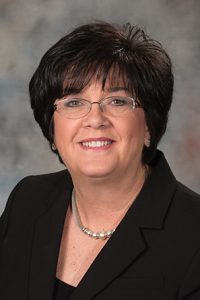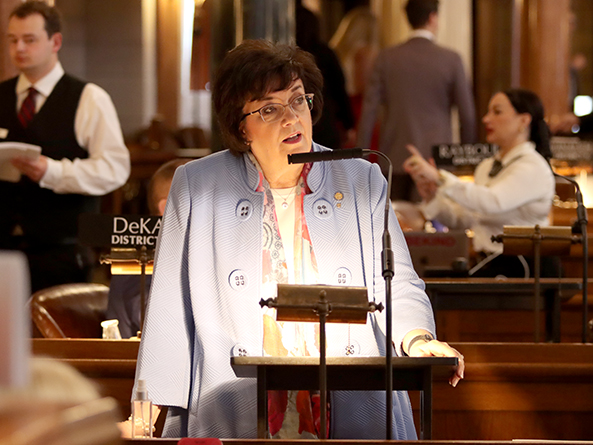Abortion restrictions advanced to select file after cloture
A bill that would prohibit abortions in all but the earliest weeks of most pregnancies advanced from general file April 12 following eight hours of debate and a successful cloture motion.

Current Nebraska law prohibits abortions at 20 weeks post fertilization.
LB626, introduced by Thurston Sen. Joni Albrecht, would create the Nebraska Heartbeat Act. Under the bill, physicians would be required to test for “steady and repetitive contractions” within the gestational sac before inducing an abortion. If such activity is detected, a physician would be prohibited from performing an abortion except in cases of sexual assault, incest or medical emergency.
A physician who knowingly violates the bill’s provisions would be subject to the removal of their license to practice medicine. No one who undergoes an abortion would be considered to be in violation of LB626.
The following would be excluded from the definition of an abortion under the bill:
• removal of an ectopic pregnancy;
• removal of the remains of an unborn child who already has died;
• an act done with the intention of saving the life or preserving the health of an unborn child; and
• termination or loss of life of an unborn child who is not being carried inside an individual’s body during the practice of in vitro fertilization or other assisted reproductive technology.
Albrecht said the measure would be the “friendliest pro-life” law for doctors in the country. Every other state that regulates abortion imposes criminal or civil penalties for unlawful abortions, she said, but LB626 would impact only a physician’s license.
“LB626 is even friendlier and more deferential to doctors than our current 20-week law,” she said. “This bill protects women, it protects doctors and it protects babies with beating hearts.”
Albrecht said the intent of the bill is to stop elective abortions in Nebraska and she estimated that the proposal would end approximately 85 percent of abortion procedures performed in the state.
Sen. Ben Hansen of Blair supported the bill, focusing on the importance of a heartbeat. Most people agree that a beating heart is a universal sign of life, he said.
“I would like to envision a Nebraska where every life is celebrated, valued and protected … especially ones with a heartbeat,” Hansen said.
Also speaking in support of the bill, Gering Sen. Brian Hardin focused on the potential impact of failing to enact stricter abortion restrictions. Most neighboring states — including Iowa, Missouri, South Dakota and Wyoming — have similar ‘heartbeat’ laws or outlaw abortion entirely, he said, which makes Nebraska a potential destination for “abortion tourism” if the state does not pass a similar measure.
“In 2020 and 2021 … there were approximately 2,400 babies killed by abortion in Nebraska, a rate of more than six per day,” Hardin said. “Allowing abortions this late in pregnancy puts Nebraska in the company of China and North Korea, rather than most democracies which limit it to much earlier in the pregnancy.”
Lincoln Sen. Danielle Conrad, speaking in opposition to the proposal, noted that abortion restrictions similar to those in LB626 have created legal uncertainties in other states that have made physicians hesitant to provide care. Many examples exist of individuals who were raped, victims of incest or who had medical emergencies or fetal anomalies and were unable to receive care, she said.
“Look in the face of women who had to flee their home state to get compassionate care and the pressure that put on their family and their bottom line and their future,” Conrad said. “Those are real things, and you’re bringing it to Nebraska needlessly.”
Sen. Jen Day of Omaha also opposed LB626. The sound heard on a six-week ultrasound is not a heartbeat, she said, but instead is the electrical activity of cells that eventually will form the portion of the heart responsible for cardiac contractions.
“In order for a heartbeat to be heard, all four chambers of the heart plus valves must be present,” Day said, “which doesn’t happen until somewhere between 17 and 20 weeks — when the term heartbeat can be deemed medically accurate.”
Lawmakers also disagreed about the potential civil and criminal implications of LB626.
Lincoln Sen. George Dungan noted that although the bill does not contain specific criminal penalties for abortion providers, it also does not repeal any of the existing criminal penalties in place related to abortion procedures.
Current law specifies that performing an abortion using anything other than accepted medical procedure is a Class IV felony, he said, and LB626 would modify what the accepted medical procedure is for physicians to follow.
“The intention of whether or not something has criminal penalties is not how a court is going to read it … they’re going to read it in conjunction with other criminal penalties that are still on the books,” Dungan said.
Sen. Julie Slama of Dunbar countered Dungan’s point, saying the definition of an accepted medical procedure refers to whether such practices are broadly accepted within the same medical specialty.
“The plain text and legislative history … illustrate that the statute deals with procedures,” Slama said. “It is not concerned with the restrictions on when an abortion is performed based on developmental markers, as with LB626.”
After eight hours of debate, Albrecht filed a motion to invoke cloture, which ceases debate and forces a vote on the bill and any pending amendments.
The motion was successful on a vote of 33-16. Thirty-three votes were needed.
Senators then voted 33-16 to advance LB626 to the second round of debate.


